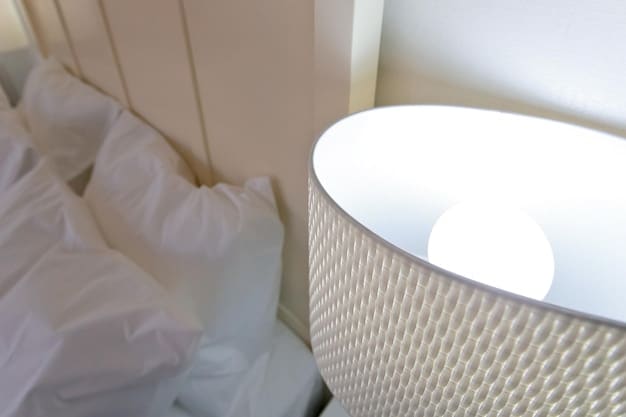Improve Your Sleep Quality: 7 Proven Ways for a Better Rest

Improving your sleep quality involves adopting simple yet effective strategies, such as optimizing your sleep environment, maintaining a consistent sleep schedule, and incorporating relaxation techniques, which can collectively enhance your rest by up to 20% within a month.
Are you tired of tossing and turning, struggling to get a good night’s rest? You’re not alone. Millions of people experience sleep problems, but the good news is that you can take control and significantly improve your sleep quality. This article will explore seven ways to improve your sleep quality by 20% in the next month, helping you wake up feeling refreshed and revitalized.
Optimize Your Sleep Environment for Deeper Rest
Creating the perfect sleep environment is crucial for achieving restful sleep. A conducive sleep environment minimizes distractions and promotes relaxation, allowing you to fall asleep faster and enjoy deeper, more restorative sleep. This involves considering various factors, from temperature and lighting to noise levels and mattress comfort.
Control Room Temperature
The temperature of your bedroom can significantly impact your sleep quality. A slightly cooler room is generally recommended, as it mimics the natural drop in body temperature that occurs as you fall asleep.
Minimize Noise and Light
External noise and light can disrupt your sleep cycles, preventing you from reaching deeper stages of sleep. Creating a dark and quiet environment is essential for optimal rest.
- Use blackout curtains to block out external light sources, such as streetlights or early morning sun.
- Consider using a white noise machine or earplugs to mask disruptive sounds.
- Ensure your bedroom is free from electronic devices that emit blue light, which can interfere with melatonin production.
By optimizing your sleep environment, you can create a sanctuary that promotes relaxation and prepares your body for a night of restful sleep. This simple step can have a significant impact on your overall sleep quality, paving the way for more energized and productive days.

Establish a Consistent Sleep Schedule
Our bodies thrive on routine, and sleep is no exception. Maintaining a consistent sleep schedule helps regulate your body’s natural sleep-wake cycle, also known as your circadian rhythm. This internal clock governs various bodily functions, including hormone release, body temperature, and alertness levels.
Go to Bed and Wake Up at the Same Time
Even on weekends, try to stick to your established sleep schedule. This helps reinforce your body’s natural rhythm and makes it easier to fall asleep and wake up feeling refreshed.
Avoid Napping Excessively
While short naps can be beneficial, long or frequent naps can disrupt your sleep schedule. If you need to nap, keep it short (20-30 minutes) and avoid napping late in the afternoon.
- Set an alarm to ensure you don’t oversleep during naps.
- Experiment with different nap durations to find what works best for you.
- If you’re struggling to fall asleep at night, consider reducing or eliminating naps altogether.
Establishing a consistent sleep schedule is a cornerstone of improving sleep quality. By aligning your sleep habits with your body’s natural rhythm, you can experience more predictable and restful nights, leading to improved daytime functioning and overall well-being.
Create a Relaxing Bedtime Routine
A relaxing bedtime routine signals to your body that it’s time to wind down and prepare for sleep. This routine can involve a variety of activities that help calm your mind and relax your muscles, creating a smooth transition from wakefulness to sleep.
Engage in Calming Activities
Avoid stimulating activities like watching action-packed movies or working on demanding tasks close to bedtime. Instead, opt for calming activities that promote relaxation.
Limit Screen Time Before Bed
The blue light emitted from electronic devices can interfere with melatonin production, making it harder to fall asleep. Try to avoid screens for at least an hour before bed.

- Read a physical book instead of using an e-reader.
- Listen to calming music or a guided meditation.
- Take a warm bath or shower to relax your muscles.
Crafting a relaxing bedtime routine is a powerful tool for improving sleep quality. By consistently engaging in calming activities each night, you can train your body and mind to associate these routines with sleep, making it easier to fall asleep and enjoy a more restful night.
Watch What You Eat and Drink Before Bed
What you consume in the hours leading up to bedtime can have a significant impact on your sleep quality. Certain foods and beverages can interfere with sleep, while others can actually promote relaxation and improve sleep.
Avoid Caffeine and Alcohol
Caffeine is a stimulant that can keep you awake, while alcohol can disrupt your sleep cycles. It’s best to avoid both caffeine and alcohol in the hours leading up to bedtime.
Limit Heavy Meals and Sugary Snacks
Eating a heavy meal or sugary snacks before bed can lead to digestive discomfort and blood sugar spikes, both of which can interfere with sleep.
Instead, opt for light and healthy snacks that promote relaxation, such as a handful of almonds or a small bowl of yogurt. Warm milk with a touch of honey is another classic sleep-promoting remedy.
Being mindful of your dietary choices before bed is a simple yet effective way to improve your sleep quality. By avoiding sleep-disrupting foods and beverages and opting for sleep-promoting options, you can create an environment that encourages restful and restorative sleep.
Incorporate Regular Exercise into Your Routine
Regular physical activity is beneficial for overall health and can significantly improve sleep quality. Exercise can help reduce stress, regulate your circadian rhythm, and promote deeper sleep.
Aim for Moderate-Intensity Exercise
Engage in moderate-intensity exercise, such as brisk walking or cycling, for at least 30 minutes most days of the week. Avoid strenuous exercise close to bedtime, as this can be stimulating and make it harder to fall asleep.
Find an Activity You Enjoy
The key to maintaining a consistent exercise routine is to find activities you enjoy. This could include dancing, swimming, hiking, or team sports. The more you enjoy the activity, the more likely you are to stick with it.
Remember to consult with your doctor before starting any new exercise program, especially if you have any underlying health conditions. Listen to your body and adjust your routine as needed.
Incorporating regular exercise into your lifestyle is a powerful strategy for improving sleep quality. By finding an activity you enjoy and making it a regular part of your routine, you can reap the numerous benefits of exercise, including improved sleep, reduced stress, and enhanced overall well-being.
Manage Stress and Anxiety
Stress and anxiety are major contributors to sleep problems. When you’re stressed or anxious, your mind is racing, and your body is tense, making it difficult to fall asleep and stay asleep.
Practice Relaxation Techniques
Engage in relaxation techniques such as deep breathing exercises, meditation, or progressive muscle relaxation to calm your mind and relax your body before bed.
Address Underlying Issues
Identify the sources of your stress and anxiety and take steps to address them. This may involve seeking professional help from a therapist or counselor.
Consider keeping a journal to track your thoughts and feelings, as this can help you identify patterns and triggers. Talking to a trusted friend or family member can also provide support and perspective.
Effectively managing stress and anxiety is essential for improving sleep quality. By incorporating relaxation techniques into your daily routine and addressing underlying issues, you can create a more peaceful and conducive environment for restful sleep.
Consider a Sleep Supplement
While lifestyle changes are the foundation of improving sleep quality, certain sleep supplements can provide additional support. These supplements work through various mechanisms, such as promoting relaxation, regulating neurotransmitters, or supporting circadian rhythm function.
Melatonin
Melatonin is a hormone that regulates the sleep-wake cycle. Melatonin supplements can be helpful for people who have difficulty falling asleep or who experience jet lag.
Magnesium
Magnesium is a mineral that plays a role in muscle relaxation and nerve function. Magnesium supplements may improve sleep quality for people who are deficient in magnesium.
It’s important to note that sleep supplements are not a magic bullet. They should be used in conjunction with healthy sleep habits, not as a replacement for them.
When considering a sleep supplement, it is crucial to consult with a healthcare professional. They can help you determine if a supplement is appropriate for you, recommend the correct dosage, and discuss any potential interactions with medications you may be taking. While supplements can be helpful, they are most effective when used as part of a comprehensive approach to improving sleep quality that includes optimizing your sleep environment, establishing a consistent sleep schedule, and managing stress.
| Key Point | Brief Description |
|---|---|
| 🛏️ Optimized Environment | Dark, quiet, and cool room for better sleep. |
| ⏰ Consistent Schedule | Regular sleep-wake times every day. |
| 🧘 Relaxation Routine | Calming activities before bed. |
| 💊 Sleep Supplement | Consider Melatonin or Magnesium after consulting a doctor. |
Frequently Asked Questions (FAQs)
Improvements can often be seen within a month by consistently implementing the suggested strategies. Individual results vary depending on personal circumstances and adherence to the tips.
No, but the more strategies you adopt, the better your chances of significantly improving sleep quality. Start with the easiest or most appealing and gradually add others.
Consult a healthcare professional. A sleep disorder may be the cause. Medical evaluations and potential interventions should be considered for persistent issues.
Generally, yes, but check with a doctor before starting new supplements or exercise. Adapt routines to fit individual health needs and conditions for optimal, safe benefit.
Absolutely. Exercise, meals, caffeine, and stress can all impact sleep. Daytime behaviors significantly shape nighttime rest quality, impacting sleep patterns directly.
Conclusion
Improving your sleep quality is an investment in your overall health and well-being. By implementing these seven strategies consistently, you can significantly enhance your sleep and wake up feeling refreshed, energized, and ready to take on the day.





